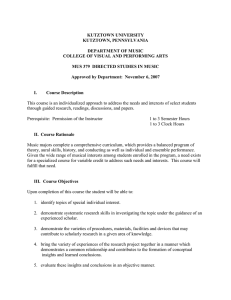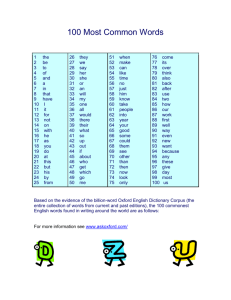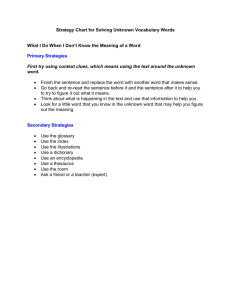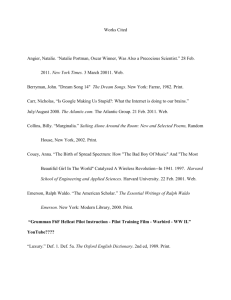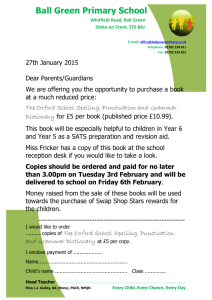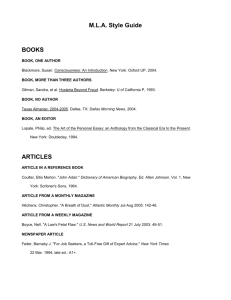KUTZTOWN UNIVERSITY KUTZTOWN, PENNSYLVANIA DEPARTMENT OF MUSIC
advertisement
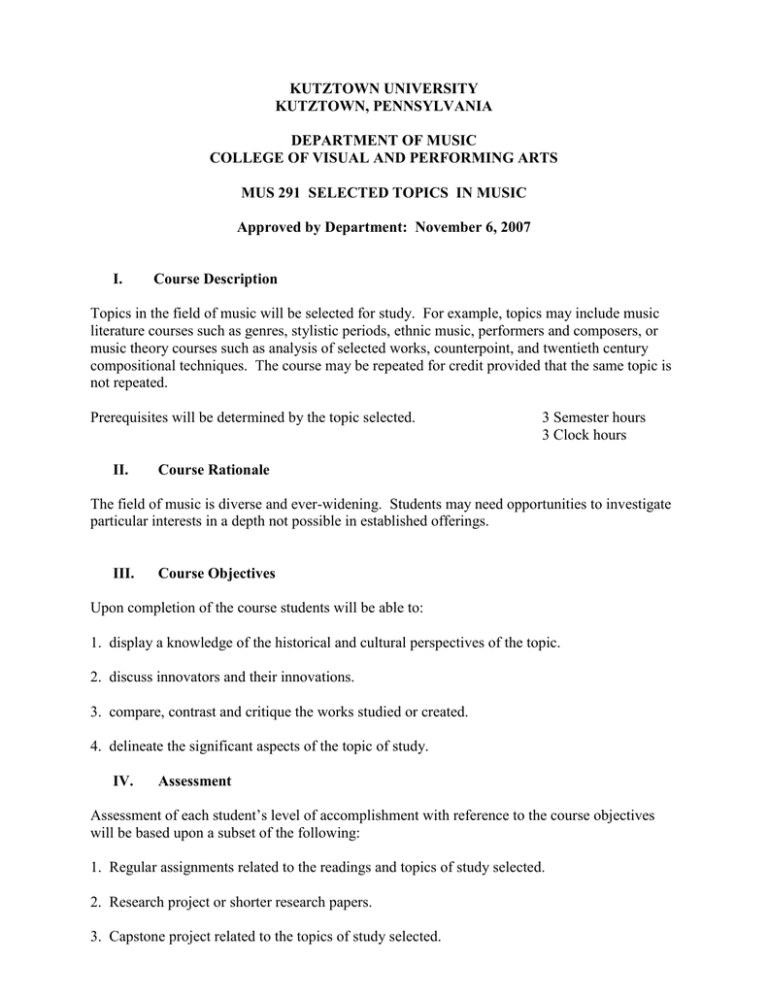
KUTZTOWN UNIVERSITY KUTZTOWN, PENNSYLVANIA DEPARTMENT OF MUSIC COLLEGE OF VISUAL AND PERFORMING ARTS MUS 291 SELECTED TOPICS IN MUSIC Approved by Department: November 6, 2007 I. Course Description Topics in the field of music will be selected for study. For example, topics may include music literature courses such as genres, stylistic periods, ethnic music, performers and composers, or music theory courses such as analysis of selected works, counterpoint, and twentieth century compositional techniques. The course may be repeated for credit provided that the same topic is not repeated. Prerequisites will be determined by the topic selected. II. 3 Semester hours 3 Clock hours Course Rationale The field of music is diverse and ever-widening. Students may need opportunities to investigate particular interests in a depth not possible in established offerings. III. Course Objectives Upon completion of the course students will be able to: 1. display a knowledge of the historical and cultural perspectives of the topic. 2. discuss innovators and their innovations. 3. compare, contrast and critique the works studied or created. 4. delineate the significant aspects of the topic of study. IV. Assessment Assessment of each student’s level of accomplishment with reference to the course objectives will be based upon a subset of the following: 1. Regular assignments related to the readings and topics of study selected. 2. Research project or shorter research papers. 3. Capstone project related to the topics of study selected. V. Course Outline The following topics are suggested as representative of selected topics. Their inclusion in the course is for the purpose of stimulating initial discussion and reflection, leading eventually to a degree of student self-sufficiency in identification of suitable research topics. 1. Composers through the ages have differed in their apparent concern to reach a receptive listening audience. To what extent is an audience essential to the artistic fulfillment of the composer's potential? 2. Composers have traditionally depended upon the artistic abilities and interpretative powers of conductors and performers to realize their compositions. Will the increased use of electronic music equipment by which musical works may be written and played without dependence on other human beings lead to a more pure or more sterile aesthetic situation? 3. What is the potential for survival of the professional performing musician in an age of perennial orchestral deficits? 4. Is governmental support of the arts a requisite for their financial survival? Will such support lead to political domination of the arts? 5. To what extent can a given art flourish in a context of relatedness with other arts? Does an atmosphere of relatedness inevitably beget a forced comparison of one art with another? Will this comparison be productive? 6. Is current "popular music" a spontaneous expression of contemporary social and economic situations or a result of manipulation of the consumer market through commercial interests? 7. How might community musical resources be improved to serve the aesthetic needs of emerging generations? VI. Instructional Resources A specific bibliography cannot be listed here for an investigation into even the several hypothetical questions included in the foregoing. However, the following list of books is representative of publications which would have information regarding many topics which might be included in the course. Apel, William. Harvard Dictionary of Music. Cambridge , MA: Harvard University Press, 1944. Belknap, S. Yancey, ed. Guide to the Musical Arts. New York: The Scarecrow Press, Inc., 1957. Belknap, S. Yancey. Guide to the Performing Arts 1957-1967. New York: The Scarecrow Press, Inc., 1960-1969. Blom, Eric, ed. Everyman's Dictionary of Music, revised edition. New York: P. P. Dutton and Company, Inc., 1962. Blom, Eric, ed. Grove's Dictionary of Music and Musicians, 5th ed., 10 vols. New York: St. Martin's Press, Inc., 1954. Busoni, Ferruccio. The Essence of Music. New York: Philo-sophical Library, Inc., 1957. Carter, Henry Hollan. A Dictionary of Middle English Musical Terms. Bloomington: Indiana University Press, 1961. Chavez, Carlos. Musical Thought. Cambridge: Harvard University Press, 1961. Cooper, Martin, ed. The Concise Encyclopedia of Music and Musicians. New York: Hawthorne Books, Inc., 1958. Crabtree, Phillip D., and Foster, Donald H. Sourcebook for Research in Music. Bloomington, IN: Indiana University Press, 1993. Dissertation Abstracts International, A volumes, Vol. 16. 1956 - Ann Arbor: University Microfilm. Duckles, Vincent, ed. Music Reference and Research Materials. New York: The Free Press, 1967. Einstein, Alfred. Essays on Music. New York: W. W. Norton and Co., Inc., 1956. Ferris, Jean. America's Musical Landscape, 2nd ed. Brown & Benchmark, 1993. Hadow, W. H. Collected Essays. Freeport, NY: Books for Libraries Press, 1928, reprinted 1968. Hines, Robert Stephan, ed. The Composer's Point of View. Norman, OK: University of Oklahoma Press, 1963. Hughes, Rupert, Deems Taylor and Russel Kerr, eds. Music Lover’s Encyclopedia, rev. ed. New York: Garden City Publishing Company, 1939. Illing, Robert. Pergamon Dictionary of Musicians and Music, two volumes. New York: The MacMill Company Company, 1964. The Instrumentalist Index. Evanston, IL. Jacobs, Arthur. A New Dictionary of Music. Chicago: Aldine Publishing Company, 1961. Koshgarian, Richard. American Musical Orchestral Music: A Performance Catalog. Scarecrow Press, 1992. Lavies, J.H. Musicalia. Oxford: Pergamon Press, 1965. Lehman, Paul R. Tests and Measurements in Music. Englewood Cliffs, NJ: Prentice-Hall, Inc., 1968. Lloyd, Norman. The Golden Encyclopedia of Music. New York: Golden Press, 1968. Lundin, Robert W. An Objective Psychology of Music, 2nd ed. New York: The Rowald Press, 1967. Madson, Clifford K. and Charles H. Madson, Jr. Experimental Research in Music. Englewood Cliffs, NJ: Prentice-Hall, Inc., 1970. Randel, Don. The New Harvard Dictionary of Music. Cambridge , MA: Belknap Press of the Harvard University Press, 1986. Reimes, Bennett. A Philosophy of Music Education. Englewood Cliffs, NJ: Prentice-Hall, Inc., 1970. Rosen, Charles. The Romantic Generation. Cambridge, MA: Harvard University Press, 1995. Rosen, Charles. Critical Entertainments: Music Old and New. Cambridge, MA: Harvard University Press, 2000. Sadie, Stanley, and Tyrrell, John. The New Grove Dictionary of Music and Musicians . New York: Oxford University Press, 2000. Sandred, Kjell Bloch, ed. The World of Music: An Illustrated Encyclopedia, 4 vols. New York: Abradalo Press, 1963. Scholes, Percy A. The Concise Oxford Dictionary of Music, 2nd ed. London: Oxford University Press, 1964. Scholes, Percy A. The Oxford Companion to Music, 9th ed. London: Oxford University Press, 1955. Slonimsky, Nicolas, ed. Baker’s Biographical Dictionary of Musicians, 5th ed. New York: G. Schirmer, 1958. Slonimsky, Nicolas, ed. The Concise Baker’s Biographical Dictionary of Musicians, 8th ed. New York: Schirmer Books, 1994. Stambler, Irwin. Encyclopedia of Popular Music. New York: St. Martin's Press, 1965. Thompson, Oscar, ed. The International Cyclopedia of Music and Musicians, 8th ed. New York: Dodd, Moad and Company, 1958. Watanabe, Ruth T. Introduction to Music Research. Englewood Cliffs, NJ: Prentice-Hall, Inc., 1967.
